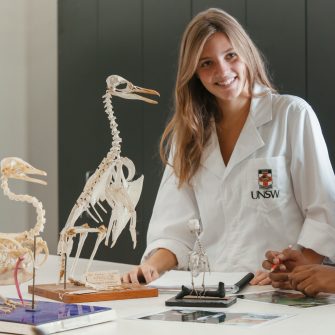Bachelor of Psychological Science (Honours)
- Commencing Terms
- Term 1
- Duration
- 1 Year(s)
- Delivery Mode
- Face-to-face (includes blended), Research
- Campus
-
Kensington
- Codes
- Program code 4518
-
2025 Indicative first year full fee
- $9,500*
-
2025 Indicative full fee to complete degree
- $9,500*
-
2025 Indicative first year full fee
- $58,500*
-
2025 Indicative full fee to complete degree
- $59,500*

- Overview
- Entry requirements
- What will I study?
- Future careers
- How to apply
- Fees & Scholarships
Overview
The Bachelor of Psychological Science (Honours) consists of a year-long major independent research project (completed under the guidance of an academic supervisor), and a thesis based on the project. In addition, you'll complete advanced core and elective coursework.
The research project may be undertaken in most areas of psychology, such as:
- psychopathology
- behavioural neuroscience
- cognitive science
- cognition and perception
- forensic psychology
- social, personality and developmental psychology.
The coursework requirement includes content that encompasses history, professional ethics, evidence-based practice and advanced coverage of selected contemporary issues in psychology.
This degree also provides an academic foundation for you to continue on to a master's by coursework, a master's by research or a PhD.
Please note this program cannot be completed part-time.
Key features
- Professional recognition
The Bachelor of Psychological Science (Honours) is an Australian Psychology Accreditation Council (APAC), opens in a new window accredited Level 2 program. It satisfies the minimum requirement for provisional registration. Honours is the next step towards becoming a registered psychologist. You must complete an honours program to be eligible for entry into a psychology master's degree.
- Research experience
In this program, you'll conduct a major research project under the guidance of one of our expert academic supervisors. Your research project can be taken in most areas of psychology. Successful completion of this professional and highly competitive degree will prepare you for the Master of Psychology degree.
- Flexibility of choice
Find a supervisor working in an area you're passionate about and tailor your project to your interests. Some areas of research include forensic psychology, developmental psychology, psychopathology, health psychology, language, cognitive science, neuroscience and vision science.
- Wide range of career opportunities
Psychologists deal with more than just mental health – they apply their knowledge to relationships, workplace stress and financial challenges. The modern-day psychologist may work across a range of environments including health, business, sport, marketing, human resources, education and more. Using your skills in psychology, you may be responsible for facilitating organisational change, exploring new ways of thinking or influencing marketing campaigns.
Why study at UNSW?
Learn with the best
UNSW Science is at the forefront of many new scientific developments, teaching and innovation. We’re responsive to the needs of industry, adaptive to change and take an innovative approach to teaching and learning. We’re ranked #2 in Australia and =#32 globally for psychology (QS World University Rankings by Subject, 2025).
Learn from industry-leading educators
You come to university to learn from the experts – researchers who are leaders in their fields, striving to create new knowledge. The School of Psychology is well known for its research tradition. Many of our staff have international reputations in their respective fields and a number are Fellows of the Australian Academy of Social Sciences. Our staff attract several million dollars in external research funds per year. Our staff publications receive more citations than any other psychology department in Australia and we have one of the highest rates of PhD graduations in psychology of any Australian university. We earn more competitive research funding and publish more Tier 1 journal articles per academic than any other psychology school in Australia.
Access cutting-edge facilities
Our teaching facilities include world-leading behavioural neuroscience laboratories and cognitive testing laboratories running specialist software that will allow you to design/implement your own psychological research and analyse/interpret the data you collect. You’ll also gain access to laboratories for the analysis of cognition and brain function, including electroencephalography (EEG), transcranial magnetic stimulation (TMS) and eye-tracking.

Want to see more from UNSW Science?
Entry requirements
-
- The 2024 Lowest Selection Rank (LSR) is the adjusted rank (ATAR plus adjustment factors) you would have needed to gain entry to this degree in 2024.
- The 2024 A levels score is based on four Advanced Level (A2) subjects. Entry scores are calculated from the best three or four A2 subjects (excluding repeated subjects) using the following values: A*=6, A=5, B=4, C=3, D=2, E=1. At most one Applied A Level subject may be included in the best four subjects used to calculate the aggregate.
- The 2024 IB Diploma is an indication of the IB you would have needed to gain entry to this degree in 2024. It is to be used as a guide only.
- The 2024 Lowest ATAR is the lowest ATAR (before adjustment factors were applied) to which an offer was made. Where <5 is listed, this indicates that less than 5 ATAR-based offers were made and so the score has not been published. N/A indicates no offers were made on the basis of ATAR.
-
At UNSW, we are committed to ensuring prospective students have all the information they need in order to make informed decisions about their study options.
To assist you in gaining a better understanding of how Admissions works at UNSW, we have provided you with a summary of ATAR offers and the student profile.
We hope this information will help you identify the degree that is right for you.
The number of places available for honours varies from year to year and depends upon the availability of School resources. Eligibility requirements vary depending on whether you are an internal or external applicant.
Internal applicants
An internal applicant is a student who completes an APAC-accredited undergraduate (or bridging) sequence in psychology at UNSW the year immediately prior to commencing honours. For example, a student completing at any point during 2022 will be considered an internal applicant for the 2023 honours year.
Admission is competitive and depends on the availability of School resources and is subject to academic performance, based on your Psychology Average (Distinction minimum). A Psychology Average of 75 is the minimum eligibility requirement but does not guarantee a place.
Refer to the School of Psychology website, opens in a new window or University Handbook, opens in a new window for information about the Psychology Average.
Please note that places are subject to availability and will be awarded based on academic performance. There is no preference given to any particular psychology sequence in gaining entry to honours and honours is the same for all students, regardless of the degree program in which they completed their undergraduate psychology major sequence.
External applicants
The number of places available for external applicants (if any) varies from year to year and depends upon the availability of School resources.
The minimum requirement for eligibility to apply for the honours year is to complete an Australian Psychology Accreditation Council (APAC), opens in a new window accredited undergraduate (or bridging) sequence in psychology, with a psychology WAM of 80 or better, within the last 10 years. Those with international psychology qualifications must have them assessed by the Australian Psychological Society (APS), opens in a new window prior to submitting an application. A psychology WAM of 80 is the minimum eligibility requirement but does not guarantee a place.
English language requirements
You may be asked to provide evidence of your English proficiency to study at UNSW depending on your educational background and citizenship. English language skills are vitally important for coping with lectures, tutorials, assignments and examinations - this is why UNSW requires a minimum English language competency for enrolment.
If you’re completing an Australian Year 12 qualification (e.g. NSW HSC or equivalent), you do not need to provide anything extra to prove your proficiency. Your qualification will be used as evidence of your English proficiency.
If you do need to provide evidence of your English proficiency, this will be indicated in your application. You can prove this by providing evidence that you meet one or more of the following criteria:
- English language tests and university English courses
- Prior study in the medium of English
- Other qualifications
If you need to improve your English skills before you start your degree, UNSW College’s Academic English Programs are for you. The programs are suitable for various English levels and help you prepare for university studies and life in Australia.
For more details, visit the English Language Requirements page.
English language requirements
You may be asked to provide evidence of your English proficiency to study at UNSW depending on whether you are from an English-speaking background or non-English speaking background. English language skills are vitally important for coping with lectures, tutorials, assignments and examinations - this is why UNSW requires a minimum English language competency for enrolment.
If English is not your first language, you’ll need to provide proof of your English proficiency before you can be given an offer to study at UNSW. You can do this by providing evidence that you meet one or more of the following criteria:
- English language tests and university English courses
- Prior study in the medium of English
- Other qualifications
If you need to improve your English skills before you start your degree, UNSW College’s Academic English Programs are for you. The programs are suitable for various English levels and help you prepare for university studies and life in Australia.
For more details, visit the English Language Requirements page.
Check the specific English language requirements for this program
What will I study?
Program structure
Students conduct a year-long, 30 UOC major independent research project (completed under the guidance of an academic supervisor), and write a thesis based on the project. In addition, students complete 18 UOC of advanced-level core and elective coursework in both Term 1 and Term 2.
| Term 1 | Term 2 | Term 3 | |
| Thesis | PSYC4072 | PSYC4073 | PSYC4073 |
| Coursework | PSYC4093 | PSYC4103 |
The Honours year commences in late January/early February and is undertaken full-time over one year. Mid-year entry and part-time enrolment are not available.
- Thesis
- Term 1
- PSYC4072
- Term 2
- PSYC4073
- Term 3
- PSYC4073
- Coursework
- Term 1
- PSYC4093
- Term 2
- PSYC4103
- Term 3
Future careers
Graduates can complete further study and supervised practice to become a psychologist with general registration, or a psychologist with an area of practice endorsement.
Graduates can also apply what they have learned about experimental design, data analysis and communication to careers in business, consulting, program evaluation, behavioural analysis and more.
Check out the UNSW Psychology Alumni Gateway, opens in a new window for some inspiration and graduate interviews.
Accreditation
The program is accredited by the Australian Psychology Accreditation Council, opens in a new window (APAC) as a fourth year of study. Graduates are eligible to apply for associate membership of the Australian Psychological Society, opens in a new window (APS).
How to apply
Applications open on 1 August and close on 15 November. Please note the application process differs depending on whether you are an internal or external applicant.
External applicants
If you have completed your APAC-accredited undergraduate (or bridging) sequence outside of UNSW, or graduated from UNSW over a year ago, you are considered an external applicant.
- Read the program handbook, opens in a new window
- Check out the Honours Frequently Asked Questions, opens in a new window
- Complete the Intention to Undertake Honours Form
- Use Apply Online, opens in a new window to submit a formal application
Internal applicants
You are considered an internal applicant if you have completed your APAC-accredited undergraduate (or bridging) sequence in psychology at UNSW, in the year immediately prior to commencing your honours year.
Find out more about the application process for internal applicants, opens in a new window.
Ready to start your application?
Applications open on 1 August and close on 15 November. Please note the application process differs depending on whether you are an internal or external applicant.
External applicants
If you have completed your APAC-accredited undergraduate (or bridging) sequence outside of UNSW, or graduated from UNSW over a year ago, you are considered an external applicant.
- Read the program handbook, opens in a new window
- Check out the Honours Frequently Asked Questions, opens in a new window
- Complete the Intention to Undertake Honours Form
- Use Apply Online, opens in a new window to submit a formal application
Internal applicants
You are considered an internal applicant if you have completed your APAC-accredited undergraduate (or bridging) sequence in psychology at UNSW, in the year immediately prior to commencing your honours year.
Find out more about the application process for internal applicants, opens in a new window.
Ready to start your application?
Fees & Scholarships
Commonwealth Supported Place: Student Contribution Band 4
*The student contribution for a Commonwealth Supported Place is an indication only of the amount payable in Year 1 based on a standard full-time load of 48 credit points (1.0 EFTSL). The actual student contribution you will be liable for depends on your individual program of study and the calendar year in which you enrol. Actual fees are calculated upon enrolment. Student contribution amounts are subject to annual review by the university and may increase each year during your studies (subject to caps determined by the Australian Government), effective at the start of each calendar year.
The indicative fees listed here are based on an estimated average and are for tuition only - other fees and charges are not included.
*Fees are subject to annual review by the University and may increase annually, with the new fees effective from the start of each calendar year. The indicative fees listed here are based on an estimated average and are for tuition only, other fees and charges are not included. The amount you pay will vary depending on the calendar year to enrol, the courses you select and whether your study load is more or less than 1 Equivalent Full Time Student Load (8 courses per year).
Indicative fees are a guide for comparison only based on current conditions and available data. You should not rely on indicative fees. More information on fees can be found at the UNSW fees website.
Indicative fees to complete the program have been calculated based on a percentage increase for every year of the program. Fee increases are assessed annually and may exceed the indicative figures listed here.
Indicative fees to complete the program include tuition plus an estimate of study-related costs of approximately $1,000 per year. To find out more about other costs, visit UNSW International.
Scholarships
At UNSW, we award over $83 million in scholarships each year. We pride ourselves on rewarding excellence and making university accessible to students from all walks of life. Whether you’re a domestic or international student, our range of scholarships, prizes and awards can support your journey.

QS World University Rankings, 2025

AFR Top100 Future Leaders Awards, 2020-2025

#1 Australian uni attended by start-up founders






